GMC’s Kara Kessler ’11 Graduates from EcoLeaguer to Sustainable Entrepreneur
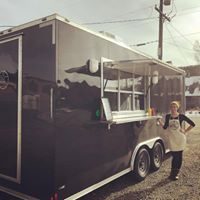
by EcoLeague Communications and Digital Media Assistant Claire Jeantheau, Dickinson ’21
Kara Kessler, a 2011 graduate of Green Mountain College, currently manages her own vegan food truck and holds a passionate interest in human relationships with the natural world. But discovering this path wouldn’t have been possible without her two-time exchanges through EcoLeague, marked by their experiential activities.
When she entered her first year at Green Mountain, Kessler was certain that she would study psychology—the high school class she found most interesting. After a “spontaneous” decision to go on an EcoLeague exchange in fall 2008 to Northland College, she learned the value of studying a broad mix of subjects.
“Green Mountain College had six hundred people at the time, so I decided that it’d be good to get out. And then I got [to Northland] and realized the importance of different areas of study, different professors,” Kessler recalled.
Kessler’s classes at Northland ranged from art and literature to adolescent psychology. However, it was a seminar on ecopsychology—a field examining relationships between humans and the natural world—that she found “the most intriguing, interesting, and defining”.
“I had a professor suggest ecopsychology,” Kessler explained, “and I had never heard of that, but it sounded very interesting. And so I studied ecopsychology… that’s when I realized I know what I want to do, I know what I want to learn more about.”
Having found her academic interest, she made the distinctive choice of completing a second EcoLeague exchange, this time at Prescott College in Fall 2010. By completing two exchanges, she was able to study ecopsychology in depth, particularly through her coursework at Prescott. Kessler credits EcoLeague with giving her the opportunity to discover a field that she wouldn’t have been able to explore at her home college.
“After my first EcoLeague experience, I realized … I can’t study [ecopsychology] at Green Mountain College, I’m going to pursue that individually, I’m going to research and tailor my degree to it.”
Because of EcoLeague’s experiential nature, many of Kessler’s favorite memories of her exchanges took place outside of the classroom. At Northland, she enjoyed studying near Wisconsin’s Lake Superior, a new environment from her home college in Colorado. There, she fondly remembers hiking in local wildlife and seeing the area’s aspens in the fall.
Later at Prescott, where she “got to take a lot of field trips,” she began her semester with a trip to Northern California to study sea psychology and marine biology for a month. The experience was made possible by Prescott’s unique schedule, which begins with an intensive three-week “Block” class before a typical pattern of semester classes.
Kessler now applies the interest in ecopsychology she cultivated in EcoLeague as the owner and operator of a vegan food truck. The Vegetable Express is based in Nederland, Colorado, and describes its goal on social media as “feeding your mind, body, and soul with plant-based foods.”
“On a different level, sustainably, I can heal the planet this way through plant-based eating, and I’m connecting to people and helping people psychologically through food. It’s been about how you relate to it, how you see it,” Kessler said, tying her EcoLeague studies to her current work. “[EcoLeague] definitely prepared me to do what I’m doing.”
If you are passing through Nederland, don’t forget to stop by Kessler’s Vegetable Express to support sustainability and, more importantly, to nurture the mind and body!
River Canyons and Open Waters: Outdoor Education with EcoLeague
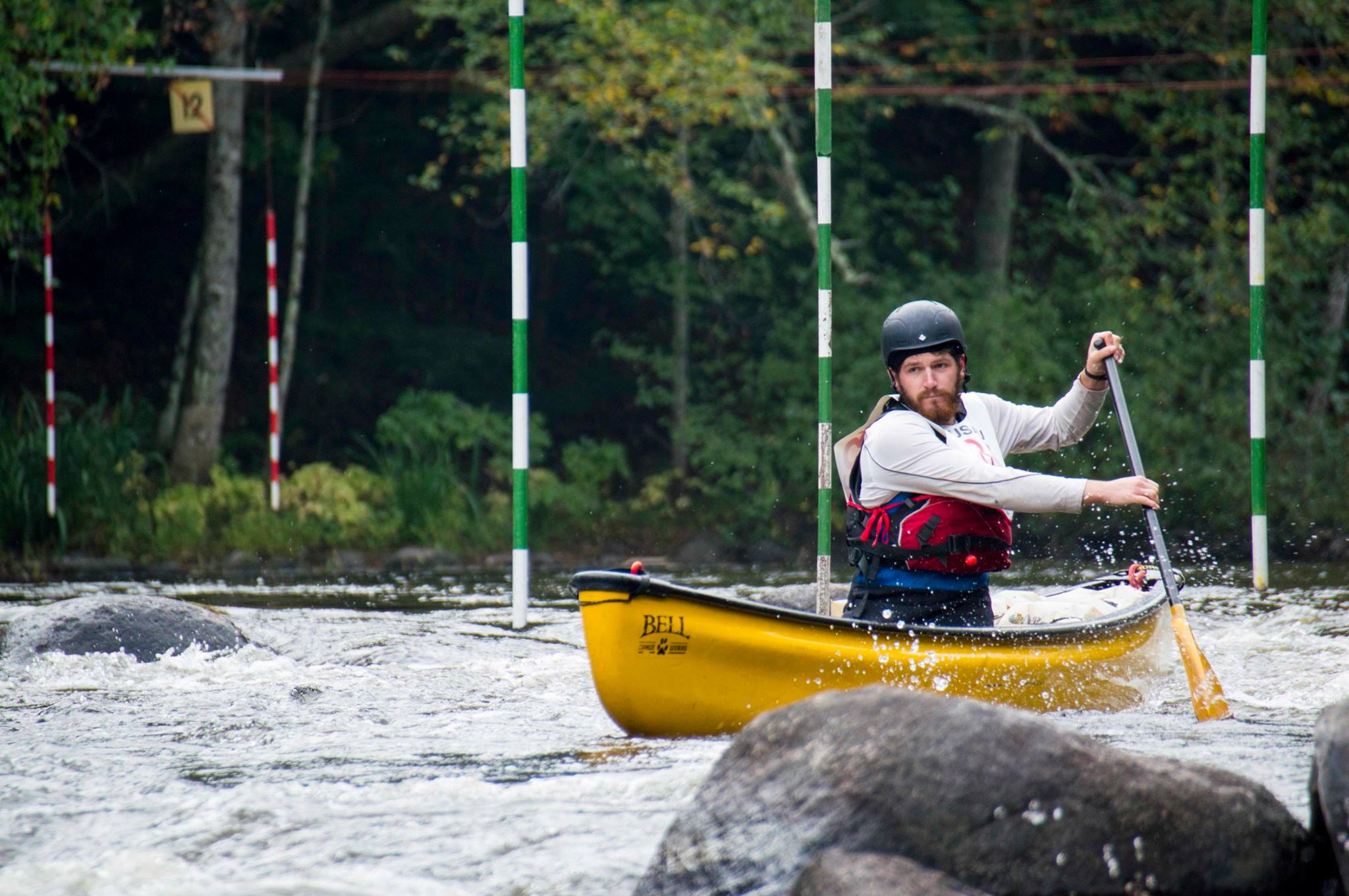
by Jasmyn DiMeglio, EcoLeague Writing Intern
Why pursue a degree in Outdoor Education? Perhaps you have a hearty appetite for travel, perhaps you’re eager to pair wilderness skills with values of equality and justice, or maybe you’re simply interested in fostering personal growth through adventure experiences with at-risk youth. For Dashiell Potter, a junior and EcoLeague exchange student, motivation stems from all of the above.
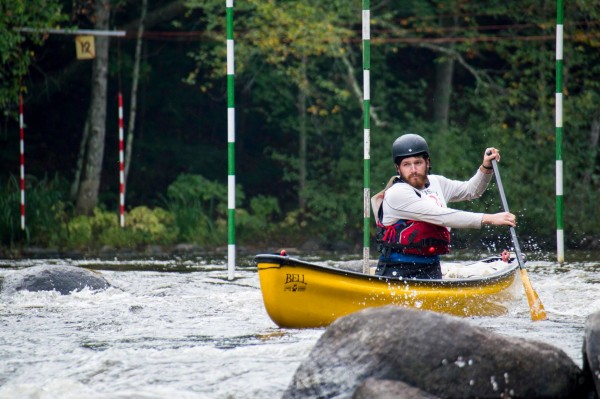
Dashiell Potter competing in a slalom race on the Wolf River as part of the Professional Development Semester.
Exercising experiential education practices, the field of Outdoor Ed. (OED) promotes both interpersonal and intrapersonal growth and aims to connect participants to the natural world. Although based in immensely different nature environments, both Northland and Prescott Colleges’ OED programs share similar core values, philosophies, and theories, which are deeply embedded in their curriculums. Located in the North woods of Ashland, WI, Northland College’s program is shaped by the breathtaking presence of Great Lake Superior as well as by the natural history and community of the region. On the other hand, nearly 1,900 miles away in Prescott, AZ, Prescott College’s program prioritizes field opportunities within the elevated desert landscape.
“Both places give a lot of opportunity for exploration”, says Dashiell Potter. Each offering a unique and wholesome approach to Outdoor Education, both EcoLeague schools serve as great foundations for students hoping to pursue their careers in the outdoors, much like Dashiell, a Northland student who participated in the EcoLeague exchange program and spent an exciting semester at Prescott.
Potter’s interest in wilderness exploration and outdoor travel started at the young age of twelve. Growing up, Dash enjoyed attending a wilderness adventure camp in Northern Minnesota but it wasn’t until after a spending a “gap” year in Patagonia through the National Outdoor Leadership School (NOLS) program, when his passion really “clicked” and he knew he wanted to pursue a degree and eventually a career in the field of Outdoor Education.
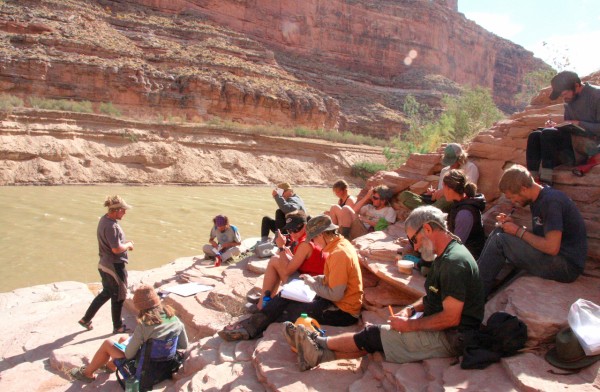
Prescott College’s field-based Wilderness Exploration Landscape course
“Outdoor Ed. is important because it gives people the opportunity to learn and grow in a different environment, other than a classroom,” says Potter. “It’s also based in experiential education, which is hands on learning– you’re learning by doing.” Learning about the importance of experiential education in the two very different regions of WI and AZ was extremely beneficial for Potter’s academic development on the path to his degree. “They both have great place-based learning aspects to their curriculum. It was great to experience a different place and program because I was able to take what I learned in the desert back home to the North woods with me,” he says.
OED also provides students with the opportunity for extensive travel. One of Dashiell’s favorite courses at Northland was “Wilderness Instructor Training”. Designed as a month long intensive field course in Arkansas, Dash learned about technical skills of whitewater paddling while simultaneously refining teaching and wilderness leadership skills. Although he took this course during his freshman year, it is still one of the most memorable for him. “This was an incredible trip where I learned about being a leader, living in the wilderness and working efficiently as a group.
Like Northland, Prescott also offers highly integrated courses which was a highlight for Dash. “These courses blend outdoor education with other disciplines, between content and experience or the tactile and the cognitive,” says David Lovejoy, an Adventure Education professor at Prescott College. Some of the integrated courses available include Bike Packing, Winter Ecology, Rock Climbing and Yoga, Environmental Issues, and Backcountry Skiing.
“Students need to experience the wild and form direct emotional relationships with the natural world. This fosters an appreciation for our place within nature and an understanding of our dependence,” says Lovejoy. A unique element of Prescott’s program that is conducive to forming these nature relationships is their block semester. During the block semester, OED majors have the opportunity for extended travel and field expeditions, as they participate in a single intensive course. This structure enables students to spend a one-month period away from campus to explore and cultivate skills in remote settings.
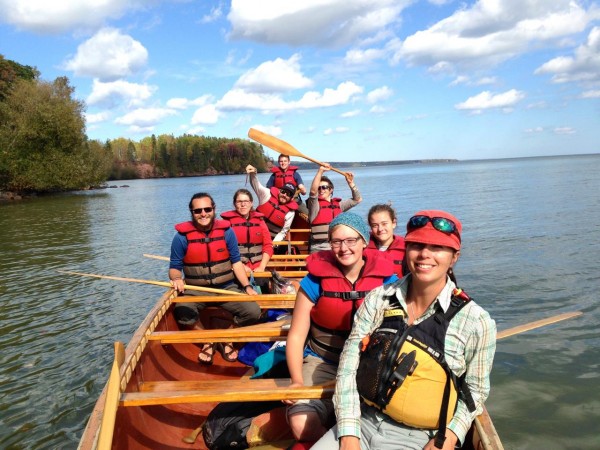
Professor Elizabeth Andre, Dash, and fellow “Fall Block” OED students paddling on Lake Superior in the 36′ Montreal canoe
Back in Ashland, WI, OED students also participate in a series of similarly intensive “block” courses during the fall semester of their junior year at Northland, which Dashiell has recently completed.
“Everyday is something new; we do a variety of things—we cover teaching skills, go to conferences, learn how to identify trees, how to build a debris shelter, or start a fire with a bow drill,” says Potter. Commonly referred to as “Fall Block”, the four-course professional development program combines land travel, water travel, woodland and craft skills (or primitive living skills) and aims to develop students as effective educators.
Another unique aspect to Northland’s OED program is its flexibility, as students are able to select one of three different emphases: Wilderness Leadership, Therapeutic and Universal Design, and Natural History. This way, students are able to focus on cultivating detailed skills useful for specific types of professions they’re interested in pursuing. Nonetheless, Northland’s core values and philosophies are reflected in all three areas of study.
“Our program has a strong foundation in social justice, equity, and inclusion of all people. We also have a foundation in environmental stewardship and sensitivity,” says Northland professor Elizabeth Andre. Through its close analysis of current challenges, practical experience and skill development, as well as future potential for the profession, Northland’s OED curriculum is geared toward promoting a critical awareness amongst their students.
“We believe that outdoor education is a tool for creating the world in which we want to live—through connecting people to the outdoors we help them discover the importance of community both ecological and social,” Andre says. Such philosophies are not only important to the success of their students, but they are also very similar to those at the heart of Prescott’s OED program.
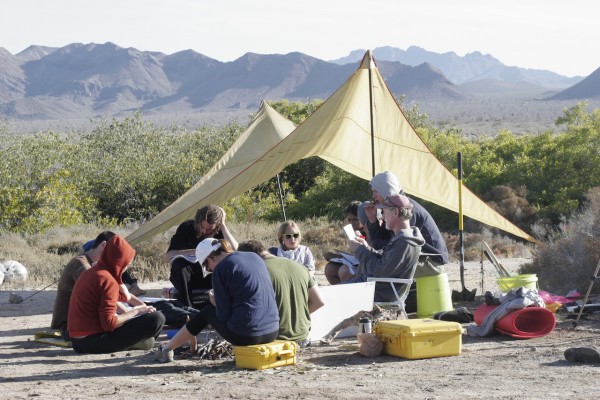
One of Prescott’s Outdoor Classrooms
“Our core values are connecting people with nature and each other in meaningful ways,” says professor Lovejoy. “We value the ability of adventure education to foster self-examination and illuminate issues of fairness and equality.” As these principles are embedded in Prescott’s curriculum, many graduates have reflected favorably upon the attributes gained here. “They have highlighted a passion for working with groups toward a common goal, as well as good communication skills and collaborative abilities,” he says.
As a soon to be graduate, Dashiell Potter is incredibly grateful to have had the opportunity to learn from both professor Andre and professor Lovejoy through his EcoLeague exchange program.
“After I graduate I’d like to work in wilderness therapy or with at-risk youth programs,” he says. “I want to take those people out into the wilderness who don’t have the opportunity to go.” Other professions Northland and Prescott graduates pursue include wilderness guides, outdoor skills instructor, outdoor business owners, program administrators, and environmental educators.
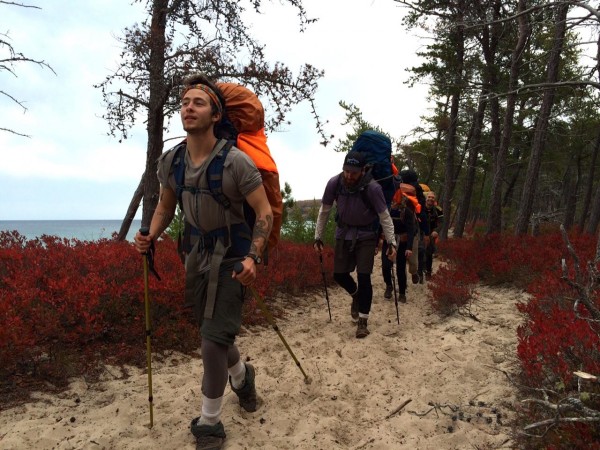
Northland’s Professional Development semester, Dash and other OED students backpacked for six days along the North Country Trail
Regardless of the profession, OED promotes important social and ecological awareness as well as personal growth through intimate connections with the natural world. These EcoLeague schools provide students with extraordinary resources, faculty support, and a riveting landscapes for developing the skills they’ll need to navigate the both outdoor and professional world. “The two areas are pretty incomparable, I have felt wonder paddling the waters of both the North and South. Learning from different professors, experiencing different teaching styles and seeing how they approach adventure education was great to experience,” says Dash.
“Farm Nimbly”: Food Sustainability at EcoLeague Schools APU and GMC
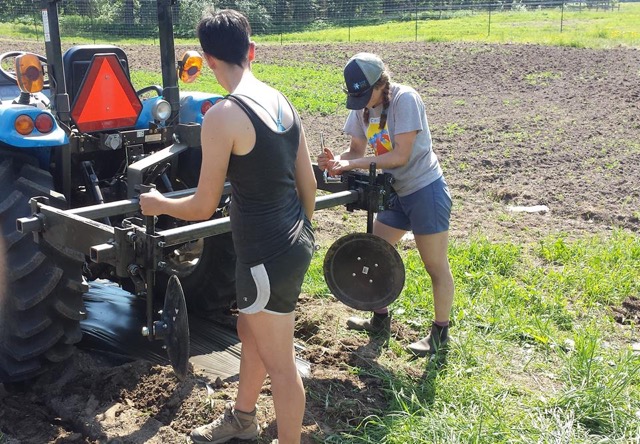
by Jasmyn DiMeglio, EcoLeague Writing Intern
“Growing food in the subarctic is not for the faint of heart,” says Megan Talley, manager of Spring Creek Farm in Palmer, Alaska. With cold, blustery winds and short growing seasons, sustaining a sturdy local food system in this region can be quite challenging.
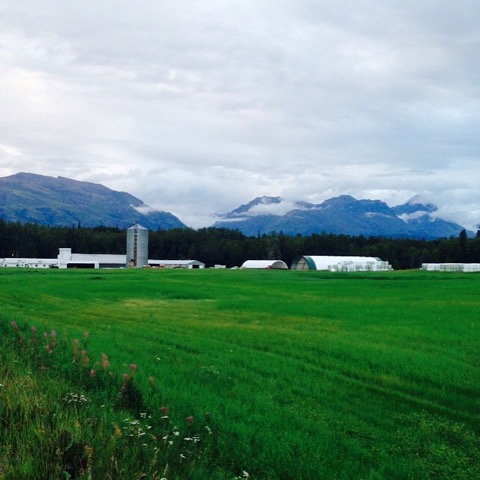
Spring Creek Farm in Palmer, Alaska
However, despite climatic obstacles, Alaska Pacific University’s Spring Creek Farm takes a progressive approach to providing surrounding communities with access to healthy, fresh, and locally grown food. A key part of this approach includes preparing the next generation of food justice activists with important skills and critical lenses to examine both economy and environment while farming in a rapidly changing world.
Meanwhile roughly 4,500 miles away, Cerridwen Farm integrates hands-on learning opportunities with Green Mountain College’s liberal arts education in Poultney, Vermont. Both projects of EcoLeague schools, Spring Creek and Cerridwen Farms are two comprehensive programs that offer ample opportunity for student action, community collaboration, and education in sustainable agriculture. Although located on opposite ends of the continent, the two farms share similar values and philosophies which include environmentally thoughtful growing methods, community building, and a focus on food justice.
As the two farms are located in extremely different bioregions, one might assume that their growing processes would differ as well. However, both GMC and APU’s programs face similar challenges of erratic climate conditions during their growing seasons.
“This part of the Earth is at the forefront of climate change. Unpredictable weather patterns, destructive climate events and soil erosion compound the threat to a secure local food system,” says Talley. Farmers in the Alaskan region also struggle with cold soil temperatures, plant “bolting” from the long hours of daylight, and very dry springs. Such conditions make it crucial that new growers are provided with the tools they need to “farm nimbly” and resist crop loss, which is something Spring Creek Farm strives toward year-round. Though these threats can be discouraging for any farmer, APU’s project and crops continue to thrive and Talley remains optimistic. “The low soil temperatures translate to the sweetest carrots anywhere,” she says.
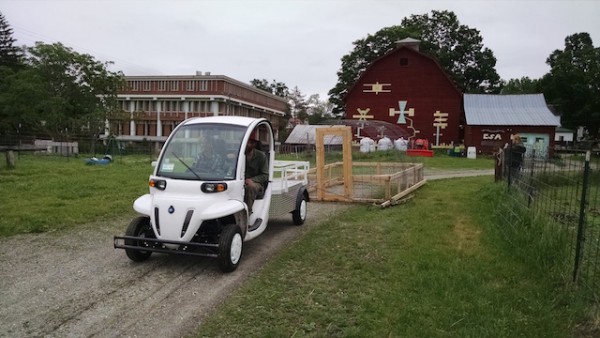
Day at Cerridwen Farm, GMC
“Farming nimbly” is a phrase that Vermont farmers can also appreciate as they grapple with complications of their own, some similar, some unique to their bioregion.
“In the last two years we have worked through a devastating hail storm, incredibly high winds, a record early freeze, and record low winter temperatures,” says Bay Hammond, the farm manager at Green Mountain College’s Cerridwen Farm. Due to these unpredictable weather patterns, GMC growers have become more dependent on their three-season houses. In addition to the outdoor Hillside Garden, the farm also has two High Tunnels and a hoop house for growing heirloom tomatoes, cucumbers, ginger, eggplants, and peppers year round. Though maintaining crops in erratic conditions can be difficult, Hammond believes each hardship becomes an opportunity for learning. These opportunities are always utilized by students involved at the farm. “The students are bright, entrepreneurial, and hard workers. They are dedicated to the farm and always step up to meet the challenges,” Hammond states.
GMC’s Farm and Food Program offers multiple avenues for student involvement at Cerridwen Farm. Some of these options include 1-3 credit skill intensive courses, work-study employment, or joining Farm Crew.
As Eleanor Tison, director of the Food Systems Program explains, “Farm Crew is an all-volunteer student organization overseen by the farm manager. Students in Farm Crew meet weekly, receive weekly email updates, and participate in running the farm.” This organization is a great way for students to apply the skills they learn in the classroom, as it offers many possibilities for engagement. Members of Farm Crew sign up for animal and vegetable chore slots, help with decision making, and become involved with special events, such as the GMC farmers’ market or the October Welsh Harvest Festival, which is an annual event open to the larger community of Poultney.
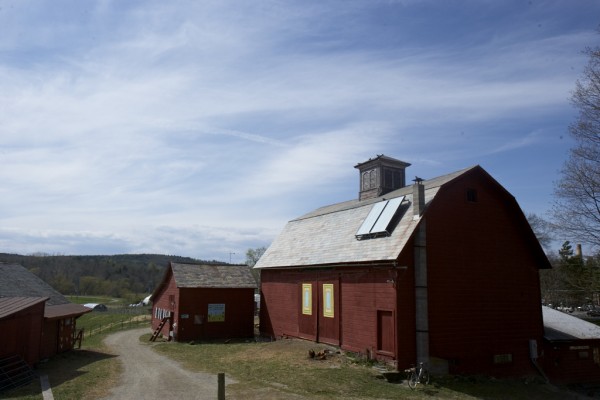
Cerridwen Barn at GMC
Special events are not the only opportunities for community engagement; Cerridwen Farm is always open and accessible to all interested visitors. “As our farm is adjacent to residential neighborhoods in the town of Poultney, we have daily visitors who visit the chickens, pigs, cattle, goats, sheep, and ducks on our farm,” says Tison. GMC also operates a self-serve “farm store” which is open 24/7 for customers looking to purchase eggs, seasonal produce, and frozen meat products.
These EcoLeague Farms are major resources for community collaboration and creative thinking in both Poultney and in Anchorage, AL.
“Community building is the basis for cultivating the Alaskan food movement. We strive to be a hub for sharing meals and ideas which will usher in a more robust and resilient local food system,” says Talley. APU’s program regularly hosts community volunteer opportunities and workshops, which are open to all, students and non-students alike. These workshops encompass many exciting topics such as native plants and permaculture design. Like the Cerridwen Farm, Spring Creek also operates a small-scale Community Supported Agriculture Share (CSA) and has a booth at the community farmers market in Anchorage. Talley describes the downtown market as a “vibrant community staple and social event” that brings folks together on a weekly basis.
The CSA program and farmers market are only two of four destinations for the produce grown through the program. Another place where Spring Creek Farm’s vegetables are used is on campus in the cafeteria. As much food as possible is distributed to dining services, but the farm also donates a portion of their bounty to low income-families through their “Alaska Tilth” program. In a fight to end hunger, Alaska Tilth was founded in collaboration with the University of Alaska’s Experiment Farm and the cooperative extension of the Supplemental Nutritional Assistance Program (SNAP).
“The fresh food our farm donates is brought to food pantries each week by a SNAP educator who demonstrates seasonal cooking with fresh ingredients, sharing a meal with those in need,” says Talley. Only within its first year of operation, Alaska Tilth has been a huge success and has plans for expansion in 2017.
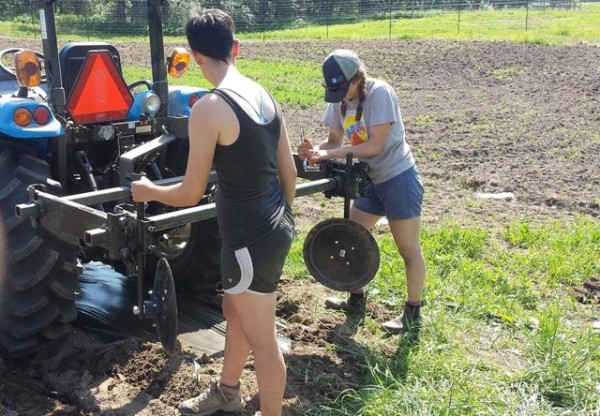
Fixing the Tractor, Spring Creek Farm
Both Spring Creek and Cerridwen Farms work as springboards for larger visions of the future. Exemplifying strong commitment to their communities, to the futures of their students, as well as to the land, these EcoLeague programs are able to thrive year round, despite climatic hardships. Offering multiple opportunities for involvement, an abundance of locally grown food, and important skills for future generations, the programs set great examples for farmers nationwide.
EcoLeague Stories: Green Mountain College

“Any experience where you are immersed in a different culture is worthwhile. Experiencing a different way of life will make you more critical and appreciative of your own beliefs and values.”
Sophie Holtz, a junior at Northland College, in an interview about her EcoLeague exchange to Green Mountain College. Read more about Sophie’s story, and how EcoLeague exchanges expand a student’s academic career and worldview at Northland’s Meet Our Students page.
Fall 2015: EcoLeague Exchange Students On The Move!
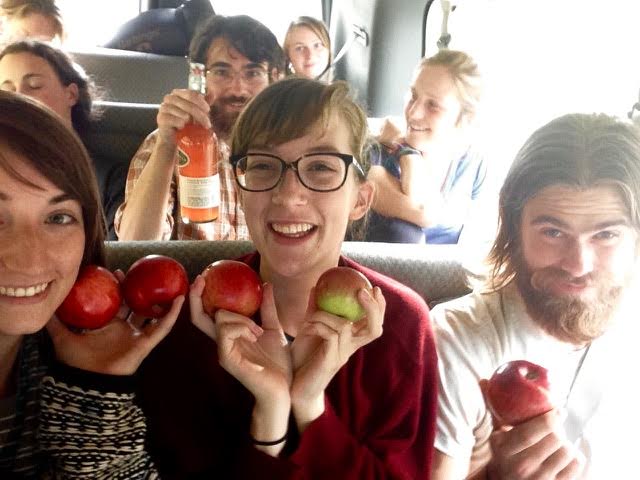
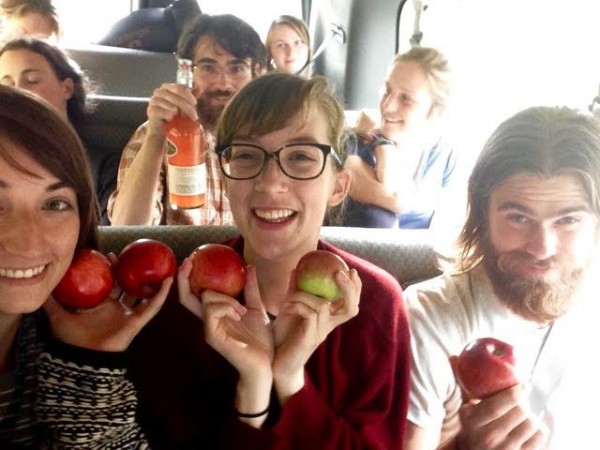
Claire Jordy (center) returning from a 2-day field trip to Vermont to study apples as part of the course “The History of Apples”. Claire is currently on exchange to COA from Dickinson.
by Jazzy DiMeglio, EcoLeague Writing Intern
What moves us, physically and figuratively? For one student, it might be an interest in apples that sparks an entire track of education. For another, a passion for soil and social justice that inspires plans for urban farming. Or perhaps it is simply a change of place that refreshes our perspective.
Claire, Emmanuel, and Elena are three of fifteen students participating in the EcoLeague exchange program this fall. A consortium of six different liberal arts colleges across the country, the EcoLeague allows students to shift their studies to another school for a semester or two during their undergraduate career. Located in different bioregions and with unique campus cultures, each EcoLeague college remains connected to the others by core values of environmental awareness, social change, and sustainability. While exploring new ecosystems, new communities, and new academic courses, the EcoLeague student is challenged to develop skills and perspectives that will not only enrich their education but also prepare them for life after college.
“I feel like I’m making a tool box,” says Claire Jordy, a junior, majoring in Environmental Studies. Currently, Claire is studying on the brisk shores of Bar Harbor, Maine, at College of the Atlantic. Although less than half the size of Dickinson College, her “home” school, COA still offers unique courses that she wouldn’t be able to take at home. Learning new skills she will be able to apply to her senior project is a major benefit of participating in an EcoLeague exchange.
“COA offers more ‘site specific’ courses,” she says. One class that drew Claire to the college is “The History of Apples.” In this course she and her classmates learn how to identify apples of the region and study the importance of preserving seedling variety. Claire dreams of one day owning her own orchard, so “The History of Apples” is especially relevant to her future aspirations. Additionally, at COA, Claire is able to work on anthropologic research methods, which she plans to use for a capstone project at Dickinson. Aside from the academics, another highlight of the EcoLeague experience for Claire has been living in a new setting. Though a bit chilly, she likes swimming in the Atlantic Ocean and hiking in the mountains of Arcadia National Park.
While Claire enjoys unique courses and exploring new landscapes in Maine, Emmanuel Greeno is developing a deeper appreciation for his home of COA while studying in Arizona this semester.
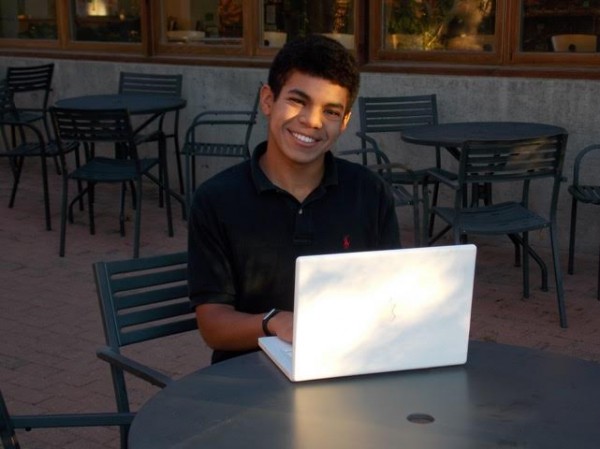
Emmanuel Greeno enjoys working outside in the surprisingly mild temperatures of Prescott, Arizona. Greeno is currently on exchange to Prescott from COA.
“I like the academics and the people here, but I really love my ‘home’ school even more now,” says Greeno of his experience at Prescott College. Also a junior, Emmanuel is on track to graduate with a Bachelor of Arts in Human Ecology, the self-directed, interdisciplinary degree that is COA’s trademark. Although immersing himself in a new community has been a high point for Emmanuel, it has also been a challenge. Prescott conducts most of its classes in the field and the majority of its students live off-campus, a sharp contrast to COA’s island location where most undergraduates are in close proximity to one another. At his home school of roughly 350 students, the community is very tight-knit, something he misses at Prescott. One place he notices this difference is in Prescott’s dining cafés, which are set-up restaurant style. Emmanuel describes eating as a “human ritual” and misses the cafeteria at COA, which is not only a place to eat, but also a place to “take a break” and connect with others.
Despite these differences, Emmanuel is enjoying his time in Arizona. A major plus for him is the academic structure available at Prescott. This semester he is taking all psychology courses. He likes that at Prescott, the psychology classes are already “established” and he can simply enroll in them, rather than having to construct a course on his own through independent study.
Going home with a fresh perspective is something else Emmanuel looks forward to adding to his education, much like Elena Santos, who has traveled from Green Mountain College in Poultney, VT to Dickinson College in Carlisle, PA for the semester. With hopes of one day starting an urban farm, Elena chose to go on an EcoLeague exchange to help her accomplish this goal. By pairing her studies in Sustainable Agriculture and Food Systems at GMC with sociology-based courses at Dickinson, she feels more prepared to farm in cities with diverse populations.
“There are a lot of perspectives at Dickinson that aren’t available at Green Mountain,” she says. Although sustainability and small class sizes are shared values at both GMC and Dickinson, Elena has noticed more differences than similarities between the two institutions. With over 2,000 students, Dickinson has a wide array of clubs and organizations to get involved with, such as dancing or language clubs. While GMC specializes in courses taught through an environmental lens, Dickinson’s curricula emphasizes multi-cultural studies, a combination Elena appreciates being able to build into her academic career.
“There are more professors of color here! That really excites me,” she says. Additionally, Dickinson hosts many international students, which creates a diverse social climate on campus. Right now, Elena is taking two courses in Gender Studies as well as the course “African American Food Ways”. Incorporating more world-views into her studies has been the best part of her EcoLeague exchange.
An EcoLeague exchange provides students with the opportunity to follow their passions. According to Claire, Emmanuel, and Elena, following passion pays off. Whether it be useful skills for a future career, a new-found appreciation for home, or increased cultural awareness, these students will return to their colleges enriched by their exchange. Movement, both physical and figurative, is possible through EcoLeague.

